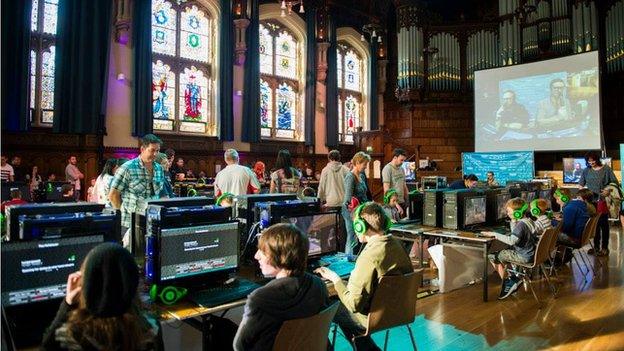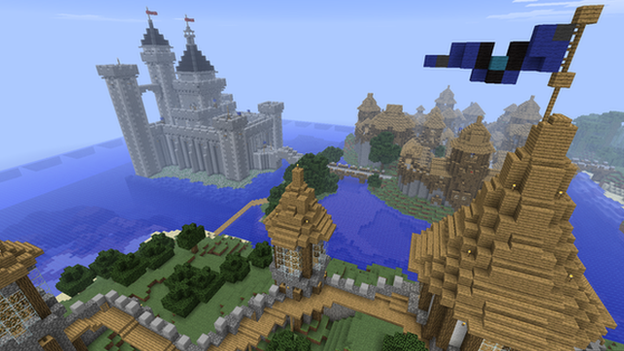Minecraft launches in NI schools in innovative technology project
- Published
Minecraft is being offered free to over 200 schools in Northern Ireland by innovation festival CultureTECH
Fifty-thousand schoolchildren in Northern Ireland could soon be playing one of the world's most popular video games in class.
Minecraft will be made available to every post-primary school as part of an innovative technology project.
It will be the first time that it has been made available to schools in this way.
Licences for the game will be given to up to 240 sites in Northern Ireland.
Minecraft is a Lego-style adventure game enabling players to use 3D blocks to create their own worlds while exploring worlds built by others.
It has had over 100 million downloads since its launch in 2009.
Now pupils in Northern Ireland will be able to use MinecraftEdu, a special version of the game that is more appropriate for the classroom.
It can be used to inspire creative writing, engage young people in city planning, and even teach quantum physics.
Londonderry-based innovation festival CultureTECH devised the project and secured £60,000 of funding from the Department of Culture, Arts and Leisure to provide free licenses to over 200 schools and 30 libraries.
CultureTECH chief executive Mark Nagurski said the game's popularity meant it could easily be used to help children learn the STEM subjects - science, technology, engineering and mathematics - as well as art, history and computer coding.
"We invited MinecraftEdu to CultureTECH last year and they spent a week at schools in Derry," he said.
"The response was ridiculous - the engagement and excitement among the pupils was amazing.
"What is really exciting is how Minecraft is being used by educators to help young people express their creative skills and develop their understanding of technology."

CultureTECH hosted a Minecraft tournament at the Guildhall in Londonderry as part of its festival in 2014
CultureTECH will work with other organisations to provide training and support to teachers who want to use the programme.
St Joseph's Boys' School in Derry has been running a pilot scheme of the project.
History teacher Darren Currie said pupils' enthusiasm in lessons using Minecraft had been noticeable.
"Our year nine pupils are participating in a collaborative project between the IT and history departments, constructing and labelling a plantation bawn from the early 17th century using Minecraft," Mr Currie said.
"I admit I was very dubious at first because I've had to put a bar on my own children using it at home, but then you see what it can do in an educational context and it can have big benefits to improve learning."
Culture minister Carál Ní Chuilín said the project had a role to play in education and economic development.
"Game players regularly exhibit persistence, risk taking, attention to detail and problem solving skills. By making Minecraft available we hope to encourage this kind of behaviour."
- Published25 March 2015
